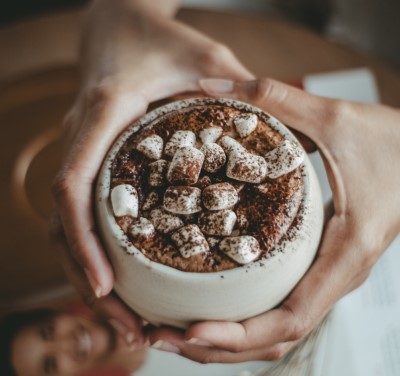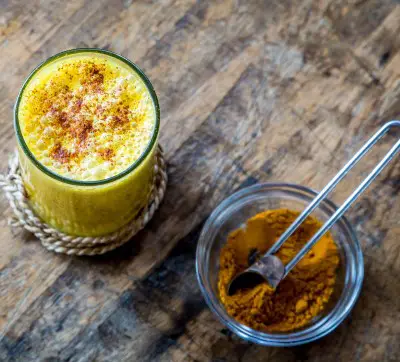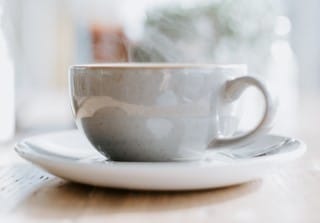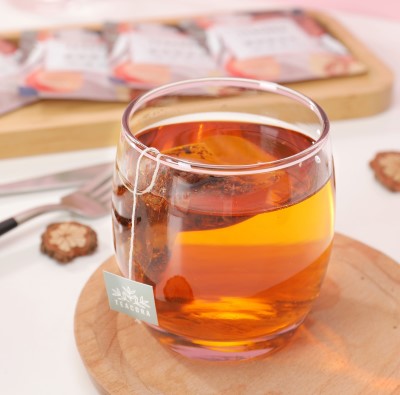
Is hot chocolate before bed bad or good for you? – What we know and how best to have it
By Jason Wooden, PhD | Updated for 2023
Hot chocolate before bed can be comforting. Cocoa has been linked to mood boosting, stress fighting, and anti-oxidant health benefits.
Unfortunately, store bought hot chocolate may worsen sleep due to naturally occurring caffeine, theobromine, and excessive added sugar.
If you suspect it’s affecting your sleep, you can try having it earlier in the evening, lower sugar brands, making it yourself with healthier ingredients, or alternatives such as hot vanilla and golden milk.
CONTENTS:
- Comforting and good, but good for you?
- Health benefits of cocoa
- The downsides for sleep and health
- Will it keep you awake?
- Can it help you sleep?
- Healthy hot cocoa tips
- How to make your own healthy hot cocoa New
- Healthier alternatives to table sugar New
- Hot cocoa alternatives worth a try
- Other things to do for your sleep
Hot chocolate before bed is good, but is it good for you?
What can beat a steamy cup of hot chocolate before bed?
It’s rich, creamy, and a delicious way to unwind at the end of the day.
While drinking chocolate started with the ancient Mayans, it’s now become a popular mainstay for children and adults. In the US, 14% of consumers say they drink two to three cups per day
It’s fair to ask if they’re any downsides from drinking hot chocolate before bed.
Every night one in three adults struggle with sleep and drinking the wrong thing before going to bed is likely an issue for some.
That’s a major potential downside for hot chocolate given the cost for poor sleep. Besides waking up tired and dragging throughout the day, sleep deprived people don’t think as clearly, don’t cope as well, and perform more poorly at school or work.
In our modern world, there’s already plenty that can get in the way of a good night’s sleep, so why make it harder?
Will a cup of your favorite hot chocolate before bed keep you awake?
Does it affect your body in other ways besides sleep?
The truth is there’s some good stuff and not so good stuff in it.
Let’s take an honest look at the benefits, how it can affect your body and sleep, and the best way to enjoy it if you suspect it’s an issue for you.
What are the benefits from drinking before hot chocolate before bed?
Your favorite cup of hot chocolate typically is made with milk, cocoa, and a sweetener. There’s also the popular add-ons – a dab of whipped cream or sprinkling of marshmallows.
Many of the potential benefits from drinking hot chocolate before bed comes from the cocoa which is made from seeds of the cacao tree.
Cocoa is believed to affect the body in various ways beneficial to sleep and health:
Mood boosting
Stress, anxiety, and depression are common issues for sleep. Researchers are finding that cocoa can have surprising effects on the brain and mood.
Studies have shown that it can help with depression, anxiety, and promote calmness. These are all big positives for sleep.
Fighting the effects of stress on the body
It’s hard to sleep when you’re all wound up with stress. Chronic stress can trigger inflammation in the body and worsen body aches making it harder to sleep at night.
Studies have shown that cocoa can help reduce stress and fight it effects on the body such as high blood pressure.
Antioxidants
Cocoa is rich in antioxidant substances called polyphenols.
They been linked to all sorts of health benefits:
- anti-inflammatory
- prevention of blood clots
- higher levels of “good” cholesterol (HDL)
- heart health
- nerve cell protection
- reduction of insulin resistance
- increased blood flow to the brain
- weight control
- anti-cancer
So, that’s the good stuff – cocoa and it’s many health benefits.
Since most people don’t drink cocoa like the ancient Mayans, we need to talk about the not so good stuff.
What are the downsides if you drink hot chocolate before bed?
Okay, let’s take an honest look at some of pitfalls from drinking hot chocolate in the evening. It’s the not so good stuff in your hot chocolate that can do you in if you’re not careful:
Caffeine
Yes, there’s natural caffeine in cocoa, although not as much as in coffee beans. A typical cup of hot chocolate will contain around 5 mg of caffeine opposed to 63 mg in a cup of coffee.
Whether this is an issue for you will depend on how sensitive to caffeine you are and how much hot chocolate you consumed before going to bed.
Most people know that too much caffeine too late can keep you awake.
However, most aren’t aware that once you fall asleep the caffeine can rob you of deep sleep. (These are the stages of sleep where your body restores and replenishes itself.)
Another downside is that it may rouse you out of your slumber for more night time visits to the bathroom. Too much fluid before bedtime does this to many people, but you get extra trouble with caffeine because it’s a diuretic.
Theobromine
Theobromine is another substance that naturally occurs in cocoa. While it’s been linked to some health benefits, it’s also has diuretic effects which may cause extra bathroom trips.
An 8 oz cup of hot chocolate can contain up to 58 mg of theobromine.
Sugar, sugar, sugar!
Did you know a cup of your favorite store bought hot chocolate has around 24 grams of sugar?
That’s a lot of sugar hidden away in your cocoa.
Most people are aware that late night sugar isn’t great for maintaining weight.
It turns out the excessive sugar is also linked to poor sleep and increased inflammation in the body.
And there’s growing evidence that sleep and inflammation are connected.
The extra inflammation can also aggravate any pain or stiffness you’re dealing with, both of which are major issues for sleep on their own.
The extra pounds you pack on and extra inflammation is bad for people fighting obstructive sleep apnea, one of the most commons sleep disorders.
It’s a real sleep killer because your breathing repeatedly stops during the night keeping you out of the restful stages of sleep. (You can read more about this here)

Will drinking hot chocolate before bed keep you awake?
Whether drinking hot chocolate before bed hurts your sleep will likely depend on a variety of factors, some obvious and some not so obvious.
Obviously, if you drink a lot of hot chocolate during the evening and it’s closer to your bedtime, the chances go up for it to cause problems.
If you’re extra sensitive to caffeine, it may keep you up even though the caffeine amounts are way lower in hot chocolate then in coffee or tea.
Many factors have been found to affect caffeine sensitivity, including genetics, gender, body weight, and hormonal changes.
Did you know that recent research has shown that over time you can become more sensitive to caffeine due to biochemical changes in your body? So, even if in the past isn’t wasn’t a problem, it can eventually catch up to you.
If you’re really caffeine sensitive you may have to avoid it entirely in the evening.
Finally, the more loaded with sugar your favorite store bought hot chocolate is the more it can cause problems for your sleep.
Unfortunately, the research on this issue is limited. A study with 440 medical students did find that whether dark chocolate negatively affected sleep depended on when it was consumed.
So, the answer is it will likely depend on how you have it, how much much you drink, the sugar content, and your individual sensitivity to caffeine.
Can hot chocolate before bed help you sleep?
By now, it should be obvious whether hot chocolate before bed helps or hurts your sleep depends on how you have it and individual factors.
Unfortunately, there’s no definitive answer since cocoa hasn’t been directly studied as a sleep remedy.
However, we do know how much stress, anxiety, and mood can affect sleep. These issues are all things cocoa is thought to help.
And we now know how bad sugar is for sleep. Also, even small amounts of caffeine may be harmful for people extra sensitive to caffeine.
Everyone’s body and life situation is different.
So, the short answer is it’s all about how you have it.
If you can avoid the pitfalls of store bought hot chocolate and maximize the positive benefits of cocoa it’s more likely to be helpful for sleep.
Healthier ways to enjoy your hot chocolate before bed
When it comes to something you love like hot chocolate and your health, it’s all about tradeoffs.
If you’re concerned your evening hot chocolate may be affecting your sleep and health, there’s plenty of things you can do to avoid the downsides and maximize the health benefits:
Look for a brand with lower sugar
According to Consumer Reports, Swiss Miss Simply Cocoa Milk Chocolate has only 13 g of sugar compared to the 24g in your typical cup. That’s still a lot of sugar, but you’ve cut it in half.
You can look for sugar free, but be careful it’s not full of artificial sweeteners or hidden sugars such as corn syrup.
How to make your own hot cocoa from scratch the healthy way
It should be clear by now that the most important thing to keep in mind about hot chocolate before bed is to be careful about how late you have it and what’s in it.
The best way to avoid some of the unhealthy downsides of hot cocoa is to make it from scratch where you control what goes in it. If you’re used to store bought hot chocolate, this is not as difficult as you think.
The keys to healthier hot cocoa are:
Unsweetened cocoa powder – try minimally processed raw cocoa which contains more beneficial flavanols
Milk – try low-fat milk, soy, almond, or oat milk
Start with the smallest amount of sweetener – avoid high-fructose corn syrup, refined table sugar, and artificial sweeteners such as Splenda; consider using smaller amounts of healthier alternatives such as honey or agave nectar.
That’s it!

One Cup:
1 cup milk of choice (can substitute with almond, oat, or soy milk)
1 tbsp pure cacao powder (raw cocoa is better)
1 tbsp (honey, maple syrup, or agave nectar; use less for monk fruit or Stevia)
1/4 teaspoon vanilla extract
Optional:
Pinch of sea salt
Dash of cinnamon, ground cardamom, peppermint extract, or orange zest
Heat the milk until just simmering, then mix in the cocoa power, sweetener, and any other ingredients.
Four cups:
4 cups milk of choice (can substitute with almond, oat, or soy milk)
4 tbsp pure cacao powder (raw cocoa is better)
4 tbsp sweetener (honey, maple syrup, or agave nectar; use less for monk fruit or Stevia)
1 teaspoon vanilla extract
Optional:
Pinch of sea salt
Dash of cinnamon, ground cardamom, peppermint extract, or orange zest
Heat the milk until just simmering, then mix in the cocoa power, sweetener, and any other ingredients.
Below are a couple of pure cocoa options that I’ve tried which have made my repeat list:
Healthier alternatives to table sugar for your hot cocoa
Table sugar isn’t the only game in town when it comes to sweetening your hot cocoa. There are plenty of alternatives worth a try that come with fewer downsides and more upsides.
Keep in mind you may have to experiment a bit to find a sweetener that works best for you and the right amount to use:
Honey
Raw honey is natural, unprocessed, and contains more nutrients than table sugar.
Maple syrup
Pure maple syrup is natural, unprocessed, and contains more nutrients than table sugar.
Agave
Low on the glycemic index, it’s 1.5 times sweeter than sugar so you can use less to get the same amount of sweetness.
Coconut sugar
Low on the glycemic index and a bit more expensive.
Monk Fruit
Natural and calorie-free, contains beneficial nutrients, and zero on the glycemic index. It’s 150 to 200 times sweeter than table sugar so you can use less to get the same amount of sweetness.
Keep in mind little goes a long way and look for something without any added sugars such as this one on Amazon.
Suggested use: 1/8 tsp (or less) to sweeten beverages
Stevia
Like monk fruit, natural and calorie-free, zero on the glycemic index, and it’s up to 400 times sweeter than sugar so a little bit goes a long way.
Look for something without any added sugars such as this one on Amazon.
Suggested use: 1/32 tsp (a few flecks of white powder) to sweeten beverages
Hot chocolate alternatives worth a try
Looking for something comforting and enjoyable yet healthier than hot chocolate before bed? There are plenty of flavorful alternatives you can try:

2) Hot vanilla
A nice alternative to hot chocolate, it typically contains milk, a sweetener, vanilla extract, cinnamon. To make it healthier, you can substitute with skim milk, soy milk, or almond milk.
Recipes:
Hot Vanilla (allrecipes.com)
Dairy-Free, Vegan, Paleo (oatmealwithafork.com)

3) Mulled hot cider
Maybe a bit old fashioned, but still a timeless evening favorite that’s easy to make.
Recipes:
Hot Mulled Cider Recipe (simplyrecipes.com)
Sugar Free Spiced Apple Cider (naturallynidhi.com)

4) Golden Milk (Turmeric Tea)
Golden milk is a traditional Indian drink made with warm milk, ginger, cinnamon, turmeric, and black pepper. Vanilla and honey is often added for a little extra flavor.
Recipes:
Golden milk recipe (easy)
Golden milk recipe (fresh turmeric root)
Don’t forget to do these other things for your sleep
Hot chocolate before bedtime may not be the only challenge for your sleep and health.
Unfortunately, there’s a long list of things that can cause or worsen sleep problems. And sometimes you can do things for your sleep that don’t address underlying issues.
Given how frustrating life can be when you sleep poorly, you want to do everything you can to ensure you’re making the best of your nights.
This makes it important to practice good sleep hygiene, the everyday habits that set the stage for deep restful sleep.
Poor sleep hygiene can sabotage everything else you do for your sleep.
For better sleep hygiene, you should:
- keep consistent wake up & sleep times
- avoid naps
- exercise during the day
- avoid large meals, alcohol, or stimulants such as
- caffeine before bedtime
- maintain a regular bedtime routine
- avoid using TVs, laptops, or other electronics before sleep
- keep your bedroom dark, cool, quiet, & relaxing
It’s also important to see a doctor, especially if poor sleep becomes a long-term problem.
Too many people are unaware how many health issues can cause problems or worsen sleep. This includes things like chronic pain, heartburn, cancer, dementia, and asthma.
You could also be living with an undiagnosed sleep disorder such as sleep apnea.
Sources:
1. “How many cups of hot chocolate (7 oz), on average, do you drink per day?”, 2019, statista.com
2. “Talking Points”, World Sleep Society website
3. “The Health Benefits of Chocolate for Your Brain May Include Memory & Mood Improvement”, 2020, University Health News
4. “Stressed Out? Cocoa or Chocolate Could Help You Sleep”, 2020, Psychology Today
5. “The Health Benefits of Cocoa Extract”, 2020, verywellfit.com
6. “5 Theobromine Benefits + Side Effects, Dosage & Reviews”, 2020, selfhacked.com
7. “Theobromine”, Drugbank online
8. Theobromine and caffeine content of chocolate products. Journal of Food Science Volume 45, Issue 2, Pages 314-316, March 1980
9. Cureus. 2019 Feb; 11(2): e4106.
10. “The 4 Best Hot Chocolate Mixes”, 2015, consumerreports.org
11. Facts About Sugar and Sugar Substitutes, Johns Hopkins Medicine website
12. What Is the Healthiest Sugar Substitute?, NUTRITIOUS LIFE
Connect with us:
About Us
Better Sleep Simplified® was founded as a place for you to get clear and well-researched information.
Our goal is to make sure you know about your options so that you take action sooner rather than later.
Check us out on YouTube:
Watch and Learn
Helpful sleep tips, interesting sleep facts and statistics you want to know about
Affiliate Disclosure
This site is a participant in the Amazon Services LLC Associates Program and other affiliate advertising programs designed to provide a means for sites to earn advertising fees by advertising and linking to them.
Important: BetterSleepSimplified.com is for informational purposes only and is not intended or implied to be a substitute for professional medical advice, diagnosis, or treatment. Always consult a physician for sleep and health concerns. See additional information.


